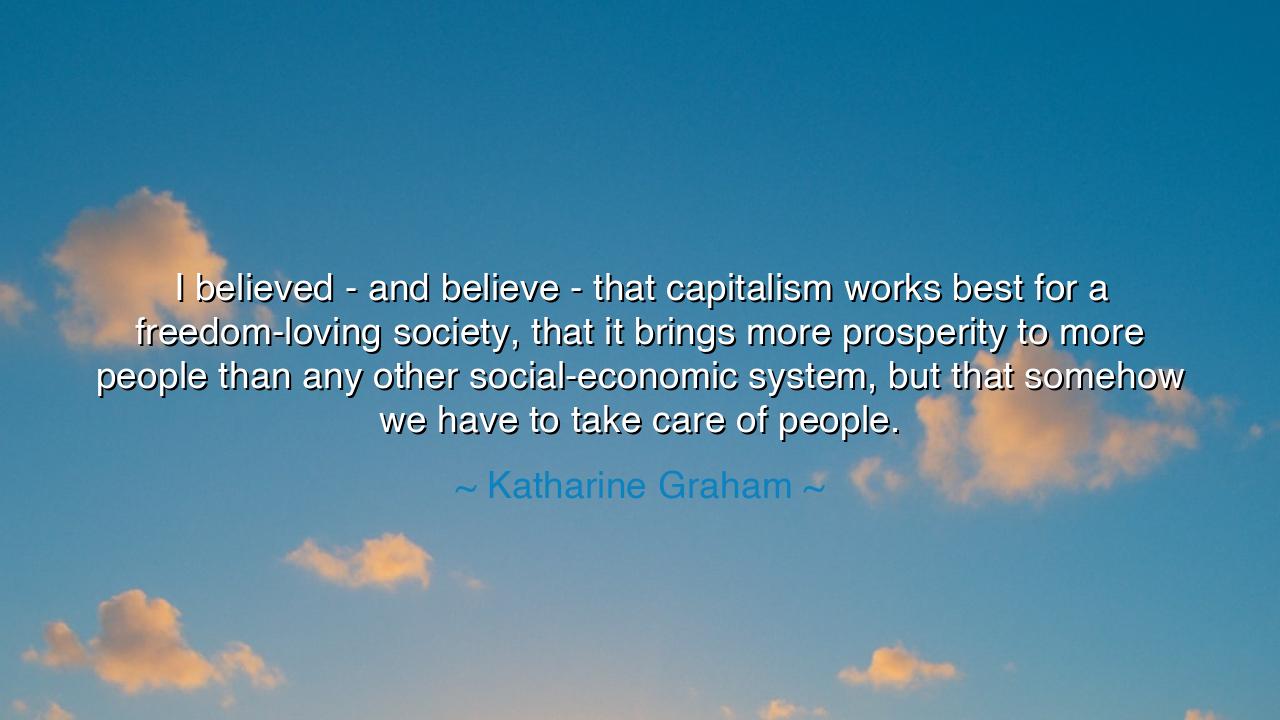
I believed - and believe - that capitalism works best for a
I believed - and believe - that capitalism works best for a freedom-loving society, that it brings more prosperity to more people than any other social-economic system, but that somehow we have to take care of people.






Hear now the words of Katharine Graham, a woman who bore the mantle of power in an age when few women were given such authority, who guided The Washington Post through storms of scandal and trials of truth. She declared: “I believed—and believe—that capitalism works best for a freedom-loving society, that it brings more prosperity to more people than any other socio-economic system, but that somehow we have to take care of people.” These words, though clothed in the fabric of economics, breathe the ancient tension of human existence: the balance between liberty and responsibility, between the pursuit of wealth and the duty to protect the vulnerable.
Capitalism, in its raw form, is like a mighty river. It flows with power, carving valleys, feeding fields, turning mills, and bearing ships. Its current is innovation, its waters opportunity, and its vast expanse holds within it the promise of prosperity. Yet, as any elder of the tribes would warn, rivers that overflow without guidance bring not nourishment but destruction. Floods can wash away homes, fields, and the fragile lives of those who dwell along their banks. So too, when capitalism runs unbridled, without the levees of compassion and the channels of justice, it leaves behind not prosperity but ruin.
Consider the tale of the Industrial Revolution. It was an age of invention, where machines roared like titans and cities grew like forests of stone. The wealth of nations multiplied, and new marvels transformed daily life. Yet, amid the smoke and iron, children labored in mines, families starved in slums, and lives were broken upon the wheel of unchecked profit. Out of that suffering rose reformers who demanded that the gains of capitalism be tempered with care—that schools be built, that hours be fair, that workers be treated as human beings and not as tools to be discarded. Without this correction, the river would have consumed its own banks. With it, the waters became a source of lasting growth.
It is this truth that Katharine Graham placed before us: that capitalism shines most brightly when it serves a freedom-loving society, when individuals are free to create, to build, to imagine. But freedom without responsibility is but another word for selfishness. If the strong grow stronger while the weak are abandoned, then the very foundations of liberty are shaken. For what freedom has the hungry? What liberty has the ill, the abandoned, the uneducated? Freedom without care is a hollow triumph, a palace with no roof.
History gives us further witness in the story of Franklin D. Roosevelt and the New Deal. In the midst of the Great Depression, the river of capitalism had run wild, leaving ruin in its wake. Banks collapsed, families lost homes, and despair hung heavy over the land. Roosevelt did not abandon capitalism, nor did he seek to destroy its current. Instead, he placed within it channels of compassion—social security, protections for workers, opportunities for the destitute. These were not chains upon liberty, but pillars upholding it, ensuring that prosperity could reach beyond the few and touch the many.
Thus the lesson, O seeker of wisdom, is clear: the pursuit of prosperity is noble, but incomplete without the duty to take care of people. To create wealth without compassion is to build monuments on sand. But to pair ambition with mercy, strength with kindness, and freedom with responsibility is to build a society that endures. True greatness lies not in what we hoard, but in what we uplift.
Therefore, let each one act not only as a maker of gain, but also as a guardian of humanity. When you build, build with room for others to enter. When you profit, remember those whose labor enabled your success. When you exercise freedom, use it not only to rise higher, but to lift those who are bowed low. Practical action flows from this truth: give where you can, create systems in your community that shield the weak, choose leaders who understand the balance between wealth and welfare. For in caring for one another, we ensure that the river of capitalism does not wash us away, but carries us forward into a horizon of shared abundance.






AAdministratorAdministrator
Welcome, honored guests. Please leave a comment, we will respond soon